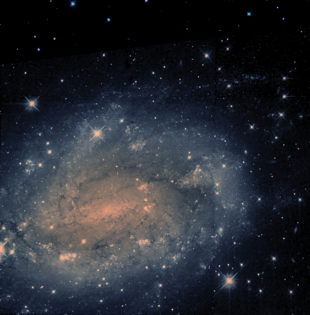NGC 6509
Appearance
| NGC 6509 | |
|---|---|
 NGC 6509 imaged by the Hubble Space Telescope | |
| Observation data (J2000 epoch) | |
| Constellation | Ophiuchus |
| Right ascension | 17h 59m 25.315s[1] |
| Declination | +06° 17′ 12.86″[1] |
| Redshift | 0.006041 |
| Heliocentric radial velocity | 1,814 km/s[2] |
| Distance | 95.3 Mly (29.22 Mpc)[3] |
| Apparent magnitude (B) | 13.10[4] |
| Characteristics | |
| Type | Sd[4] |
| Size | ~58,500 ly (17.93 kpc) (estimated) |
| Apparent size (V) | 1.6′ × 1.2′ |
| Other designations | |
| NGC 6509, UGC 11075, LEDA 61230, MCG +01-46-002, PGC 61230[5] | |
NGC 6509 is a spiral galaxy in the equatorial constellation of Ophiuchus. It was discovered on July 20, 1879 by the French astronomer Édouard Stephan.[6] This galaxy is located at a distance of 95.3 million light-years (29.22 Mpc) from the Milky Way,[3] and is receding with a heliocentric radial velocity of 1,814 km/s.[2]
This is a bulge-less disk galaxy[7] with a morphological classification of Sd.[4] The plane of the galaxy is inclined at an angle of 41°±4° to the plane of the sky, and the oval outline is oriented along a position angle of 280.8°±1.1°[7] with an angular span of 1.6′.[4]
The eastern side of this galaxy lies in the foreground of a radio source designated 4C +06.63.[7]
See also
[edit]References
[edit]- ^ a b Brown, A. G. A.; et al. (Gaia collaboration) (2021). "Gaia Early Data Release 3: Summary of the contents and survey properties". Astronomy & Astrophysics. 649: A1. arXiv:2012.01533. Bibcode:2021A&A...649A...1G. doi:10.1051/0004-6361/202039657. S2CID 227254300. (Erratum: doi:10.1051/0004-6361/202039657e). Gaia EDR3 record for this source at VizieR.
- ^ a b Tully, R. Brent (May 1, 2015). "Galaxy Groups: A 2MASS Catalog". The Astronomical Journal. 149 (5): 171. arXiv:1503.03134. Bibcode:2015AJ....149..171T. doi:10.1088/0004-6256/149/5/171. ISSN 0004-6256.
- ^ a b Crook, Aidan C.; et al. (February 2007). "Groups of Galaxies in the Two Micron All Sky Redshift Survey". The Astrophysical Journal. 655 (2): 790–813. arXiv:astro-ph/0610732. Bibcode:2007ApJ...655..790C. doi:10.1086/510201. S2CID 11672751.
- ^ a b c d Böker, Torsten; et al. (March 2002). "A Hubble Space Telescope Census of Nuclear Star Clusters in Late-Type Spiral Galaxies. I. Observations and Image Analysis". The Astronomical Journal. 123 (3): 1389–1410. arXiv:astro-ph/0112086. Bibcode:2002AJ....123.1389B. doi:10.1086/339025.
- ^ "NGC 6509". SIMBAD. Centre de données astronomiques de Strasbourg. Retrieved 2024-08-22.
- ^ Seligman, Courtney. "NGC Objects: NGC 6500 - 6549". Celestial Atlas. Retrieved 2024-08-22.
- ^ a b c Watson, Linda C.; et al. (June 2012). "Properties of Bulgeless Disk Galaxies. II. Star Formation as a Function of Circular Velocity". The Astrophysical Journal. 751 (2). id. 123. arXiv:1204.1555. Bibcode:2012ApJ...751..123W. doi:10.1088/0004-637X/751/2/123.
